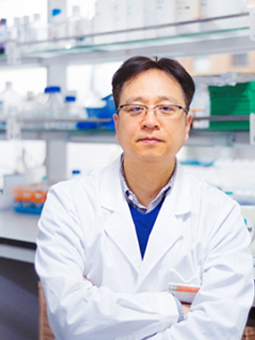
Education
1989.09~1997.07 Bachelor in Medicine,Tianjin Medical University
1997.09~1999.07 Master in Biochemistry,Tianjin Medical University
1999.09~2003.07 Ph.D in Biochemistry & Molecular Biology,Peking Union Medical College
Professional Experiences
2004.02~2007.06 Postdoctoral associate, Weill Cornell Medical College, USA
2007.07~2013.07 Research Associate,Dept. of Pathology and Laboratory Medicine, Weill Cornell Medical College, USA
2013.07~2014.09 Research Assistant Professor, Dept. of Pathology and Laboratory Medicine, Weill Cornell Medical College, USA
2014.10~present Professor, Dept. of GI Cancer Biology, Tianjin Cancer Institute,
Tianjin Medical University Cancer Institute & Hospital
Research Focus
Our research focuses on two areas:
1) Dysregulated ubiquitin modification & cancer
Ubiquitin modification of cellular proteins plays a vital role in maintaining the balance between normal cell growth and uncontrolled cell proliferation. Accordingly, dysregulation of the ubiquitination process has been shown to contribute to oncogenesis. we are currently employing acombination of biochemistry, cell biology, and genetic approaches to investigate the roles of the ubiquitination machinery in carcinogenesis, cancer progression, and anti-cancer drug resistance.
2) Chinese herbal medicine (CHM) against cancer
Compared to modern western drugs, CHM offers a brighter perspective in treating complex diseases such as cancer, owing to its “multi-active component, multi-drug target, and multi-function” characteristics. However, understanding the scientific basis of CHM against cancer at the molecular level and in a systematic manner is still one of the great challenges in CHM research. We are currently exploring a novel strategy on CHM study by integrative exploiting of network pharmacology, bioinformatics, pharmacokinetics, biochemistry, cell biology, and genetic approaches, aiming to translate CHM from an “experience-based medicine” into a modern “evidence-based medicine”.
Selected Publications
1. UBE2C overexpression in melanoma and its essential role in G2/M transition. Guolong Liu, Jun Zhao, Boyu Pan, Gang Ma, Liren Liu. Journal of Cancer. 2019; Accepted.http://www.jcancer.org/v10p2176.htm
2. USP14 as a novel prognostic marker promotes cisplatin resistance via Akt/ERK signaling pathways in gastric cancer. Ying Fu, Gang Ma, Guolong Liu, Bin Li, Hui Li, Xishan Hao, Liren Liu. Cancer Medicine. 2018;7(11):5577-88.https://www.researchgate.net/publication/327698938_USP14_as_a_novel_prognostic_marker_promotes_cisplatin_resistance_via_AktERK_signaling_pathways_in_gastric_cancer
3. Uncovering the action mechanism of polydatin via network pharmacological target prediction. Boyu Pan, Yuanyuan Ren, Liren Liu. RSC Advances. 2018;8:18851-8.https://www.researchgate.net/publication/325327303_Uncovering_the_action_mechanism_of_polydatin_Via_network_pharmacological_target_prediction
4. Add-On therapy with Chinese herb medicine Bo-Er-Ning capsule (BENC) improves outcomes of gastric cancer patients: a randomized clinical trial followed with bioinformatics-assisted mechanism study. Boyu Pan, Jingyuan Zang, Jie He, Zhen Wang, Liren Liu. American Journal of Cancer Research. 2018;8(6):1090-105.https://www.ncbi.nlm.nih.gov/pmc/articles/PMC6048393/
5. Long non-coding RNA PTENP1 functions as a ceRNA to modulate PTEN level by decoying miR-106b and miR-93 in gastric cancer. Rupeng Zhang, Yuenan Guo, Zhenchi Ma, Gang Ma, Qiang Xue, Fangxuan Li, Liren Liu. Oncotarget. 2017;8(16):26079-89. http://www.oncotarget.com/index.php?journal=oncotarget&page=article&op=view&path[]=15317&path[]=48955
6. A novel microRNA signature predicts survival in stomach adenocarcinoma. Bowen Ding, Xujie Gao, Hui Li, Liren Liu, Xishan Hao. Oncotarget. 2017;8(17):28144-53.http://www.oncotarget.com/index.php?journal=oncotarget&page=article&op=view&path[]=15961&path[]=51019
7. Down-regulated CUL7 in gastric carcinoma (GC) correlates to GC histopathological features. Boyu Pan, Bin Ke, Huiqing Zhang, Gang Zhao, Bowen Ding, Gang Ma, Liren Liu. International journal of clinical and experimental pathology. 2017;10(6):6357-63.
8. Essential role of the CUL4B ubiquitin ligase in extra-embryonic tissue development during mouse embryogenesis. Liren Liu, Yan Yin, Yuewei Li, Lisa Prevedel, Elizabeth H Lacy, Liang Ma, Pengbo Zhou. Cell Research. 2012;22:1258-69.https://www.nature.com/articles/cr201248
9. CUL4A abrogation augments DNA damage response and protection against skin carcinogenesis. Liren Liu, Sharrell Lee, Jianxuan Zhang, Sara B. Peters, Jeffrey Hannah, Yue Zhang, Yan Yin, Andrew Koff, Liang Ma, Pengbo Zhou. Molecular Cell. 2009, 34:451-60.https://www.sciencedirect.com/science/article/pii/S1097276509002731?via%3Dihub
10. T to C substitution at -175 or -173 of the gamma-globin promoter affects GATA-1 and Oct-1 binding in vitro differently, but can independently reproduce HPFH phenotype in transgenic mice. Liren Liu, Zhanwen Du, Hualu Zhao, Xiaoling Liu, Xiaodong Huang, Jie Shen, Limei Ju, Fude Fang, Junwu Zhang. Journal of Biological Chemistry. 2005, 280(9): 7452-9.http://www.jbc.org/content/280/9/7452